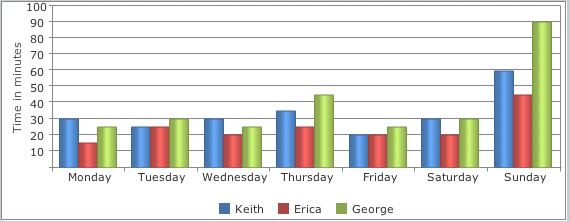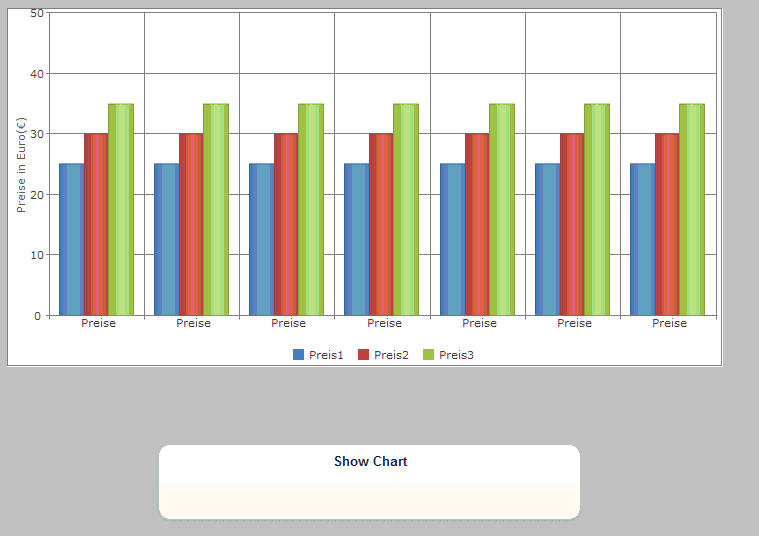JqxChart
Description
jqxChart is an easy to use chart widget based on the popular jQuery library.
jqWidgets is a commercial product, which depending on how you use it, requires a license fee. Complete details are on jqWidget's website. The product is well supported.
jqxChart supports several common chart types. You can easily plot series of different types on a common chart. A type must be specified for each series group. Currently jqxChart supports the following series types:
- column - simple column series
- stackedcolumn - stacked column series
- stackedcolumn100 - percentage stacked columns
- line - simple streight lines connecting the value points
- stackedline - stacked lines
- stackedline100 - percentage stacked lines
- spline - smooth lines connecting the value points
- stackedspline - smooth stacked lines
- stackedspline100 - percentage stacked smooth lines
- area - area connecting the value points with streight lines
- stackedarea- stacked area with streight lines between the points
- stackedline100 - percentage stacked area
- areaspline - smooth area connecting the value points
- stackedareaspline - smooth stacked areas
- stackedareaspline100 - percentage stacked smooth area
- pie - circular chart divided into sectors, illustrating proportion
- scatter - data is displayed as a collection of points
- bubble - data is displayed as a collection of bubbles
Properties and Methods
This control is well documented on the jqWidget's website: http://www.jqwidgets.com/jquery-widgets-documentation/.
Example (JavaScript)
function Button1_onclick() {
//Render the chart.
$("#Chart2").jqxChart(Chart2_settings);
}
var sampleData = [
{ Day:'Monday', Keith:30, Erica:15, George: 25},
{ Day:'Tuesday', Keith:25, Erica:25, George: 30},
{ Day:'Wednesday', Keith:30, Erica:20, George: 25},
{ Day:'Thursday', Keith:35, Erica:25, George: 45},
{ Day:'Friday', Keith:20, Erica:20, George: 25},
{ Day:'Saturday', Keith:30, Erica:20, George: 30},
{ Day:'Sunday', Keith:60, Erica:45, George: 90}
];
Chart2_settings.source = sampleData;
Chart2_settings.categoryAxis = {
dataField: 'Day',
showGridLines: false};
Chart2_settings.seriesGroups =
[
{
type: 'column',
columnsGapPercent: 30,
seriesGapPercent: 0,
valueAxis:
{
minValue: 0,
maxValue: 100,
unitInterval: 10,
description: 'Time in minutes'
},
series: [
{ dataField: 'Keith', displayText: 'Keith'},
{ dataField: 'Erica', displayText: 'Erica'},
{ dataField: 'George', displayText: 'George'}
]
}
]
Example (BASIC)
Dim sampleData, row
Function Button1_onclick()
'Render the chart.
$("#Chart1").jqxChart(Chart1_settings)
End Function
Function Form1_onshow()
sampleData = []
For i=0 To 6
row=[]
row["id"] = "Preise"
row["Preis1"] = 25
row["Preis2"] = 30
row["Preis3"] = 35
sampleData[i]= row
Next
Chart1_settings.source = sampleData
Chart1_settings.categoryAxis={dataField:"id", showGridLines:True}
Chart1_settings.seriesGroups = [ _
{ _
type: "column", _
columnsGapPercent: 30, _
seriesGapPercent: 0, _
valueAxis: _
{ _
minValue: 0, _
maxValue: 50, _
unitInterval: 10, _
description: "Preise in Euro(€)" _
}, _
series:[ _
{ dataField: "Preis1", displayText: "Preis1"}, _
{ dataField: "Preis2", displayText: "Preis2"}, _
{ dataField: "Preis3", displayText: "Preis3"} _
] _
} _
]
End Function
To resize a chart:
Chart1.resize(100,100,600,400)
$("#Chart1").jqxChart("refresh")

